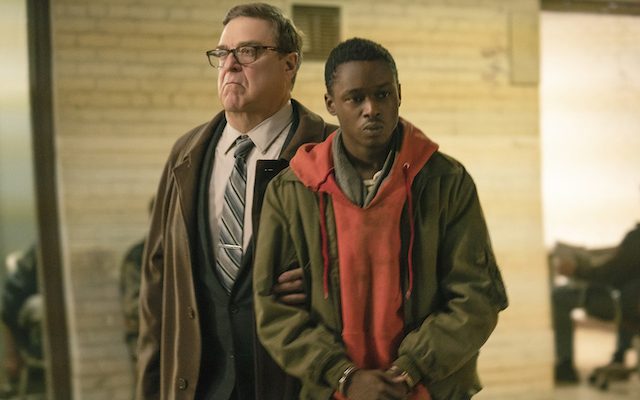
“Captive State” is geeky, serious sci-fi told with a straight face and no comic relief. This is essential because, like most geeky sci-fi, it’s a hair’s breadth from cheesiness: A few missteps and the whole thing becomes a campy laughingstock. But director Rupert Wyatt, who made the similarly perilous “Rise of the Planet of the Apes” and co-wrote “Captive State” with his wife, Erica Beeney, defies his frustratingly cheap budget with handheld cameras and a docudrama style that thrusts us into the urgency of the situation. In short, we believe it, no matter how ridiculous it is.
The film is set nine years after all of Earth surrendered to an alien invasion, putting humanity under extra-terrestrial rule. America still has essentially the same form of government, but now the legislators are aliens. Our law enforcement, collaborating with the invaders, have turned us into a police state, and every human has been outfitted with an “identity implant” in the neck. Moreover, the general consensus among humans now is that the alien takeover was a good thing. Our country was a mess before first contact, and now it’s been cleaned up! Crime is at an all-time low, so you can walk the streets safely (as long as you never say anything critical of the E.T.s in D.C.).
Our story is concerned with both sides of the brewing war: the underground Resistance (who are widely viewed as terrorist insurgents) and the police, represented by John Goodman as a determined agent named Mulligan. It’s hard to accept Goodman as anything other than, well, a good man, so we give him the benefit of the doubt that he’s been brainwashed by alien propaganda and is simply doing his job. On the other side, a young man named Gabriel (Ashton Sanders) has ties to a secret group of resisters called Phoenix — led by his supposedly martyred brother, Rafe (Jonathan Majors) — that’s planning something big at an upcoming Unity Rally where the aliens are scheduled to make an appearance.
Wyatt and Beeney’s screenplay shows thought and consideration. Technological development came to a halt when the aliens took over and jammed digital signals, so most people who aren’t collaborators have outdated computers and communication devices. The Resistance is all analog now, including the use of carrier pigeons. Newspapers are important again. Everything in occupied Chicago, where the action is set, looks authentically grimy and rundown, like the world in “Ready Player One” was supposed to be.
Recognizable actors are strewn throughout: Vera Farmiga as an upscale prostitute who gives Mulligan information; Alan Ruck as a Phoenix member working on the inside; Kevin Dunn (from HBO’s “Veep”) as Mulligan’s alien-supporting boss. Goodman’s authoritative presence gives the film weight, and Ashton Sanders (“Moonlight”) continues to be a quietly soulful actor who commands attention whenever he’s onscreen (which isn’t enough).
While the plot has its shocking moments, it’s not built on twists or pyrotechnics but on the secret machinations of Phoenix and the feds. Parallels to real-world propagandists and their collaborators are clear without being heavy-handed. It’s a bit overlong, but Wyatt’s earnest intensity had me hooked for most of it. I for one, do NOT welcome our new insect overlords.
B (1 hr., 49 min.; )





